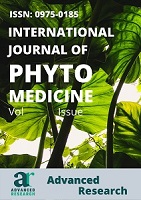Effect of Carum carvi and Curcuma longa on hormonal and reproductive parameter of female rats
Keywords:
Antifertility, Estrogenic, Reproductive, Curcuma longa and Carum carviAbstract
Background: Rhizome of Curcuma longa and seeds of Carum Carvi a folk medicinal plant used as have antifertility potentials. Present investigation study the effect of both the plant on hormone and reproductive parameter of female rat. The aqueous and ethanolic extract of rhizome of Curcuma longa and seeds of Carum Carvi used for testing antifertility activity in female rat. Aqueous and ethanolic extract of plants were administered orally to female rat for 30 consecutive days. Estrous cycle, reproductive hormones (LH, FSH and estrogen) and weight of reproductive organ were studied in both control and extract-administered groups by using standard methods Results: The female albino rats after oral administration of different doses of aqueous and ethanolic extracts of Carum carvi and Curcuma longa, showed a significant antifertility activity. FSH and LH level was significantly decreased in both drugs while amount of estrogen in ethanolic extract of both the drugs treated animals was found to be increased. The blockage of estrus phase induced by treatment of aqueous and ethanolic extract of both drug. They also increase the weight of ovary, uterus and body weights while uterine weight in immature rats increased in extract treated group. Conclusions: The present study which was undertaken to find endocrinological and physiological changes in the reproductive system of female albino rats after oral administration of different doses of aqueous and ethanolic extracts of Carum carvi and Curcuma longa, showed a significant antifertility activity.
References
Ramchandran R, Bhide SV, Chaisas SD,
Lambe S, Vaidya BD. Antiinflammatory
activity of turmeric oil in arthritis model in rat,
(Proceeding of International congress on
“Ayurveda-2000”, Chennai, 2000) pp. 199-
Darka HMM. Hypolipidemic effect of
Curcuma longa in rabbit. Hamdard Med.
,1999, 42: 26-29.
Kim MS, Kang HJ, Moon A. Inhibition of
invasion and induction of apoptosis by
curcumin in H-rat-transformed MCF-10A
human breast epithelial cells. Arch Pharm Res,
, 24: 349-354.
Bhagat M, Purohit A. Anti-fertility effect of
various extract of Curcuma longa in male
albino rats. Indian Drugs, 2001, 38: 78-81.
Singh G, Kapoor IP, Pandey SK, Singh UK,
Singh RK. Studies on essential oils: part 10;
antibacterial activity of volatile oils of some
spices. Phyto Res, 2002, 16: 680–682.
Khayyal MT, El-ghazaly MA, Kenawy SA,
Seif-el-Nasr M, Mahran LG, Kafafi YA,
Okpanyi SN. Antiulcerogenic effect of some
gastrointestinally acting plant extracts and their
combination. Arzneimittelforschung, 2001, 51:
–553.
Zheng G, Kenney PM, Lam LKT.
Anethofuran, carvone, and limonene: potential
cancer chemopreventive agents from dill weed
oil and caraway oil. Planta Med, 1992, 58:
–341.
Nakano Y, Matsunaga H, Saita T, Mori M,
Katano M, Okabe H. Antiproliferative
constituents in Umbelliferae plants II.
Screening for polyacetylenes in some
Umbelliferae plants, and isolation of panaxynol
and falcarindiol from the root of Heracleum
moellendorffii. Biol Pharm Bull, 1998, 21:
–261.
Eddouks M, Lemhadri A., Michel JB. Caraway
and caper: potential anti-hyperglycaemic plants
in diabetic rats. J Ethnopharmacol, 2004, 94:
–148
Kokate CK. Practical Pharmacognosy. IV ed.
New Delhi: Vallabh Prakashan. 2003 107-
p.
Telefo PB, Moundipa PE and Tachna AN.
Effects of an aqueous extract of Aloe buettneri
, Justica insularis, Hibiscus macranthus ,
Dicliptera verticillata on some physiological
and biochemical parameters of reproduction in
immature female rats. J Ethnopharmacol, 1998,
-200.
Hafez ESE. Reproduction and breeding
techniques for laboratory animals.
Philadelphia, Lea and Febiger, 1970.
Guyton: Physiology of the Human body. 6th ed.
Philadelphia Saunders College., Publishing,
Chang E. Estrogenic activity of some
isoflavone derivatives. Science, 1954, 129:
-578.
Mehrotra PK and Kamboj VP. Hormonal
profile of coronoridine Hydrochlorides an
Antifertility Agent of plant origin’. Plant
Medica, 1978, 33:345-349.
Francis CM. The distribution of oestrogenic
flavonoids in the genus Trifalium. Aust J Agric
Res ,1969, 18:47 -54.
Pathak S, Jonathan S and Prakash AO. Timely
administration of extract of Ferula jaeschkeona
causes luteolysis in the ovary of cycle guinea
pig. Indian J. Physical Pharmacol, 1995,
:395 -399.
Martin P. Phytoestrogen interaction with
estrogen receptor in human breast cancer cells.
Endocrinology, 1972, 103: 1860.
Folman Y. The interaction in the immature
mouse of potent oestrogens with coumenstrol,
genestein and other utero-vaginotropic
compounds of low potency. J Endocrinology,
, 34: 215.
Jonathan S, Dehodrais PAO. Estrogenic
activity in the ethanolic extract of Buplerirum
marginatum. Ind. J. of Pharmacology, 1995,
:258 -261.
Fowler MD. Plant poisoning in free living wild
animals: A review. J Wild Life ,1983,19:34-43.



